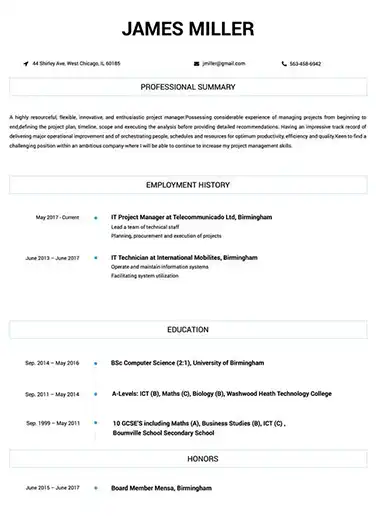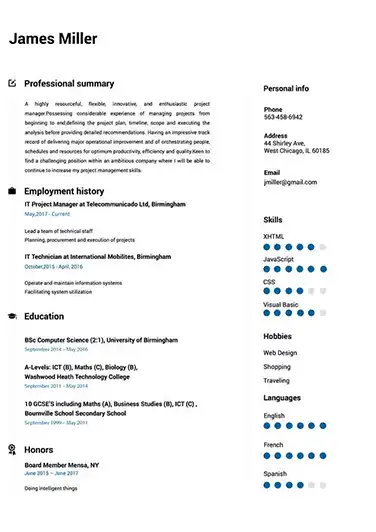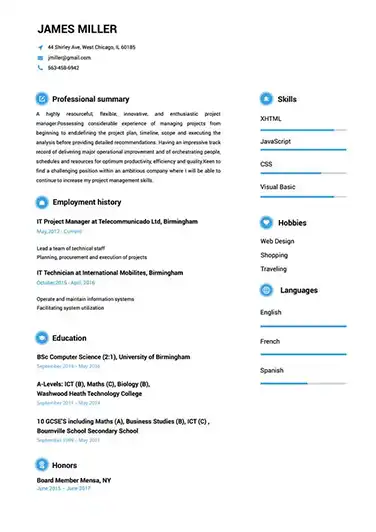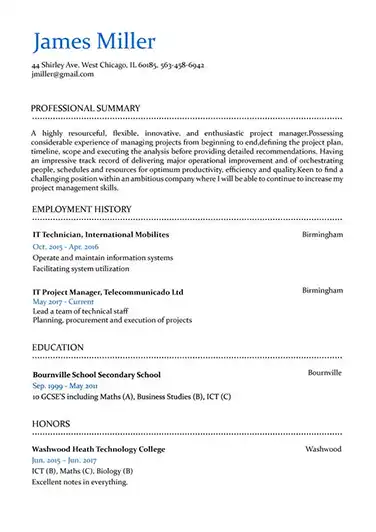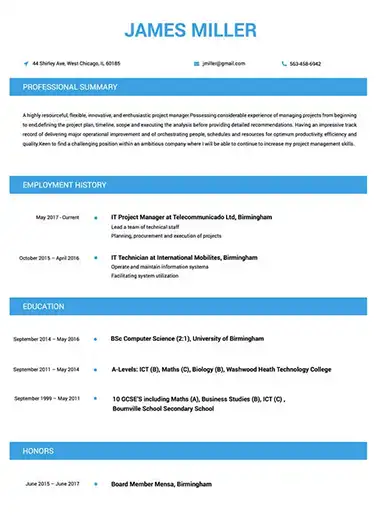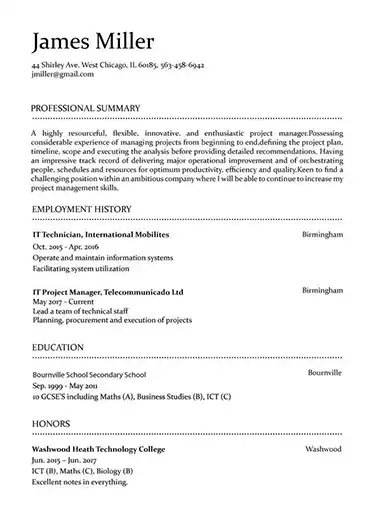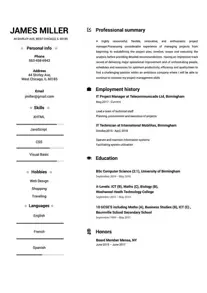 Use This Template
Use This Template
Build your resume in 15 minutes
Create an awesome resume that meets the expectations of potential employers with our selection of professional, field-tested resume templates.
public relations: Resume Samples & Writing Guide
smithisaac83@yandex.com
794-921-9617
Professional Summary
Employment history
- Coordinating special events and press conferences
- Developing and managing crisis communication plans
- Monitoring, analyzing, and reporting on media coverage
- Developing and managing content calendars
- Creating content for digital and traditional channels
- Developing and managing social media campaigns
- Coordinating special events and press conferences
- Developing and executing strategic public relations plans
- Assisting with brand awareness initiatives
Education
Skills
Do you already have a resume? Use our PDF converter and edit your resume.
young_jonathan@gmail.com
853-427-6356
Professional Summary
Employment history
- Creating content for digital and traditional channels
- Coordinating with creative and digital teams
- Developing and managing measurement and evaluation plans
- Managing media inquiries and interview requests
- Developing and managing measurement and evaluation plans
- Creating and managing budgets
- Monitoring, analyzing, and reporting on media coverage
- Creating and managing budgets
- Developing and managing measurement and evaluation plans
Education
Skills
kennyirving@yahoo.com
983-450-4974
Employment history
- Writing press releases, media pitches, and other communications materials
- Developing and managing social media campaigns
- Cultivating relationships with media contacts and influencers
- Cultivating relationships with media contacts and influencers
- Writing press releases, media pitches, and other communications materials
- Creating content for digital and traditional channels
- Developing and managing social media campaigns
- Writing press releases, media pitches, and other communications materials
- Monitoring, analyzing, and reporting on media coverage
Education
Skills
jeffking@mail.com
899-499-2085
Professional Summary
Employment history
- Creating and managing budgets
- Monitoring, analyzing, and reporting on media coverage
- Cultivating relationships with media contacts and influencers
- Creating content for digital and traditional channels
- Monitoring, analyzing, and reporting on media coverage
- Developing and executing strategic public relations plans
- Cultivating relationships with media contacts and influencers
- Developing and executing strategic public relations plans
- Coordinating special events and press conferences
Education
Skills
andersonwilliam@icloud.com
815-828-5683
Professional Summary
Employment history
- Creating content for digital and traditional channels
- Creating and managing budgets
- Assisting with brand awareness initiatives
- Managing media inquiries and interview requests
- Monitoring, analyzing, and reporting on media coverage
- Coordinating with creative and digital teams
- Researching and staying up-to-date on industry trends
- Writing press releases, media pitches, and other communications materials
- Cultivating relationships with media contacts and influencers
Education
Skills
Not in love with this template? Browse our full library of resume templates
As a PR specialist, the business hiring you needs to know they can trust you when things get tough. You need to clearly demonstrate that you’re independent, work well under pressure, creative in solving problems, and much more. But clearly showing all of that on a resume is far from easy.
That said, if you wanted an easy job then you wouldn’t be in PR. Fortunately, we’ve compiled our best tricks, advice, and examples to show you precisely what you need to do to land your next PR role. So before you start sending off that dull resume you’ve used for years, give this guide a read-through and see what you can do to beat out the competition.
What you’ll learn in this guide:
- How to use PR resume examples for inspiration
- The formatting rules for the best PR resume
- How to get past ATS
- What recruiters look for in a PR specialist resume
- How to make your achievements stand out
- The best job qualifications to include
- What makes PR skills more effective on a resume
- The power of targeting your resume for specific roles
- How to prepare for the interview process
- And more!
PR resume template examples to get you started
When learning the basics of PR, one of the main ways you learn is through case studies. Whether you want to know what to do or what not to do, seeing PR in action is probably the best way to learn. It’s not that different with resumes. We recommend starting by having a look at some high quality PR specialist resume examples to get a feel for what the end goal of your resume process should be.
Be sure to make a list of the elements you like and don’t like about these resumes. There’s no one perfect PR resume, so you should be taking the best of what you find to incorporate into yours.
[Examples]
How to write a public relations (PR) specialist resume that will get you the job
There’s a fundamental question you’re always asking yourself in PR: who is the audience. Everything you do to represent a client has a specific audience in mind, otherwise it’s nearly impossible to come up with the right strategy. Fortunately, that same strategy will serve you well with your resume.
Before you start writing, you need to carefully consider the two main audiences your resume has. Everything you do from this point onwards should be done with them in mind. Let’s discuss them both in detail.
How to ensure you get past ATS
Despite what the vast majority of job seekers think, the first place your resume usually goes when submitted is not to a recruiter or HR professional but to an algorithm. Applicant Tracking Systems (ATS) are AI-driven programs designed to sort through resumes and decide which should be immediately rejected. They are used by most large companies but can still often reject qualified resumes because of errors or misunderstandings.
That’s why it’s so critical to avoid those errors through early preparation. The good news is that you can do this by following three simple steps.
- Be sure the resume you submit is the right file type. Nearly all ATS are designed to read .doc, .docx, and .pdf files. Submitting anything else will likely mean your resume is automatically rejected.
- Use a resume builder to ensure your file is ATS-optimized. Some files are easier for ATS to read than others because of the way the data is structured within the file. Images, columns, charts, and other formatting can confuse ATS and lead to rejections. The best solution is to create your resume with a builder specifically designed to generate ATS-friendly files.
- Get smart about how you use keywords. The basic way ATS function is by being given a set of skills and other requirements that resumes should meet. The problems come when ATS struggle to understand what’s written on the resume. To avoid this, list your skills, experience, etc. as closely to how they’re written in the job description as possible. This maximizes the chance that ATS correctly identify that your experience and skills meet their requirements.
How to give recruiters what they’re looking for
Once your resume sails past ATS it lands on the screen of a recruiter, the second audience you need to prepare for. But what is that recruiter looking for in your resume? This can be broken down into a few key things.
The first is the same thing the ATS was looking for. The recruiter will have a set of minimum requirements your resume needs to meet. Your mission is to make it as easy as possible for them to see that you meet the requirements. Lucky for you, this has already been taken care of when you prepared for ATS.
Otherwise, think about other ways to make that recruiter’s job easier. Using modern design can make your resume more aesthetically pleasing, carefully reviewing the text can help ensure it’s easy to read and understand, and minimizing its length can lessen their workload. In other words, at every step of your resume creation process, consider that recruiter and how you can make it as easy as possible for them to say “yes” to you.
How to format your resume
Many of the best ways to optimize your resume for recruiters come down to formatting. This is all about how you structure the information on your resume. You wouldn’t bury the lede in a press release, so don’t hide your most impressive achievements somewhere on the middle of your resume’s third page.
This is why the main formatting rule you need to follow is to put the most important information towards the top. This means using a resume objective or summary to give the main points right from the start and listing your experience in reverse chronological order (meaning your most recent work at the top).
Again, the thing to do is imagine you’re the recruiter and go through each section of your resume imagining the questions you might have. Controlling the order of information helps control the narrative you’re conveying, making the information in your resume more impactful.
The best length for a PR resume
Recruiters are always busy, so you need to consider their time constraints. That’s why you want your resume to be as short as possible while still providing the critical information it needs to. Generally you want to aim for 1-2 pages, leaning towards the shorter end if you’re less experienced.
But instead of taking a prescriptive rule like “your resume should always be one page,” the best rule to follow is this: only include information that makes your resume better. Look at each section and sentence and ask yourself “is this adding value to my resume?” If the answer is no, then get rid of it. That rule should make it easier to get your resume down to a reasonable 1-2 pages.
Top sections to include
While the sections you use should be tailored to your experience, these are the top ones we recommend for a PR specialist resume:
- Resume objective or summary
- Work experience
- PR achievements
- Education
- Certifications
- Hard skills
- Soft Skills
How to make your achievements stand out
As a PR specialist you know that achievements don’t amount to much if you can’t sell them. What recruiters look for is specific, concrete examples of what has resulted from your work as well as a focus on value provided to clients. Let’s examine some examples to show what this looks like in practice.
Coordinated many PR-focused events.
A bad impression is worse than no impression at all and this “achievement” illustrates that well. Instead of sounding impressive, it reads as vague. This means a recruiter seeing it would likely take away a negative impression of this candidate. If they’re going to work in PR, they need to at least be able to sell their own achievements after all. Let’s compare that to an improved version.
Coordinated and ran monthly press conferences to announce new products and field questions from journalists, resulting in an average of 8.5 articles in major publications.
This example makes it clear what role this person played and what the result was. But beyond that, the wording gives the impression that they are competent, detail oriented, and in control. In other words, it makes them sound like a top-notch PR expert, exactly the kind of impression you need to create.
How to make your skills more effective
The same techniques you used to make your achievements stand out should also be applied to your skills. Simply listing your skills is easy, but it doesn’t do anything to create a strong feeling in a recruiter that you actually possess those skills. What will do that is listing specific examples of when you’ve demonstrated them, or backing them up with training or a certification. Let’s look at some examples to better understand how to do this properly.
Excellent at building and maintaining media relationships
This is a critical PR skill, but getting specific will give it a far greater impact on the recruiter reading it.
Excellent at building and maintaining media relationships
-Actively worked with journalists from Forbes, Huffpost, and NYT through 3 PR positions and over 10 years.
By getting more specific you can give a recruiter a far better idea of what that skill means in practice. While the first version is the kind of thing you can easily read and immediately forget, the second one makes you consider just how good this candidate is at maintaining media relationships and what that could do for your own business.
The best PR hard skills to include
- Writing press releases
- Planning and running press conferences
- Writing speeches
- Media outreach
- CMS platforms
- Social media marketing (listing specific platforms)
- SEO
- Brand management
- Research
The best PR soft skills to include
- Building and maintaining media relationships
- Written and oral communication
- Crisis management
- Attention to detail
- Negotiation and persuasion
- Confidence
- Creative problem solving
- Charisma
- Team management
- Networking
How to list your education
Most people list their education on their resume as a given, but as a PR relations specialist, should you? It depends on a few things. The more recent and relevant to PR your education is, the more likely you should include it. Use that same rule we mentioned earlier, ask yourself if listing your education and details about it adds value for the recruiter.
If you do decide to list your education, here are two examples to illustrate how to do it.
BA in English
Brown University
1999-2003
-Recipient of university writing award
-Ran events for my sorority
To start, this degree is really too old to be included. Even if it were an actual degree in PR, after nearly two decades of professional experience, that work should be what gets you the job, not a degree from another era of PR. The other details would be worth mentioning if this person were a recent graduate because they connect with PR. But ultimately, this example is too old to be worth mentioning.
BA in Public Relations
New York University
2014-2018
-Worked on the university PR team to organize events as an on-campus job
-Volunteered as a media liaison for the NYU chapter of Greenpeace
This example is absolutely worth including because the degree is both recent and directly related to PR. The other details are also PR related, though the candidate should also consider what the specific employer they’d like to work with would think about their campus volunteering. The Sierra Club or WWF would love that experience while a company like Chevron likely would not. Always consider company culture and values when deciding which details to include or emphasize anywhere on your resume.
If you don’t have a degree in PR or are looking to brush up your skills, obtaining a certification is an easy choice. This is particularly true if you’re a recent graduate, looking to change careers, or otherwise don’t have very much professional experience.
Certifications to consider adding
- Public Relations Society of America (PRSA) Accredited in Public Relations (APR) Certification
- PRSA Certificate in Principles of Public Relations
- Udemy PR courses
- Coursera PR courses
What are ideal PR specialist job qualifications and how to list them correctly
The specific qualifications you’ll be expected to have will vary based on the specific PR role. This is another reason to always target a custom resume for each job you’re applying to. That said, the core qualifications you’ll generally want to emphasize will be:
- Experience dealing with media through press conferences, releases, relationship building, etc.
- Getting ahead of and handling PR problems.
- Putting together and executing PR strategies.
- Measuring the results of your work.
These are the 4 core areas your resume should emphasize throughout.
The best way to start a PR resume
Once you’ve got a clear idea of which skills, qualifications, and achievements you want to emphasize on your resume, you should use an opening objective or summary to mention them. This is the best way to get ahead of questions that might arise as a recruiter reads your resume and to form a strong first impression.
How to write a resume objective
A resume objective will generally be only about one sentence and should concisely explain who you are and what you aim to achieve with your PR resume. The good news is that you should already be experienced writing this kind of copy in press releases. The bad news is that this means expectations will be high.
I’m a certified PR expert with the skills to handle any crisis your company might encounter.
This resume objective has a lot going on and none of it is good. Beyond the basic mistake of not writing it in the third person, it’s vague and makes a promise this person cannot possibly keep. A skeptical recruiter will read this as you starting off your resume by lying to them, which is not how you want to start off that relationship. Let’s see an improved version.
APR certified PR specialist with 8 years experience building startup brands like Alterion and Microstars looking to bring this experience to build Ace Solutions into the most recognized brand in marketing automation.
This objective clearly states the candidates basic qualifications and how they'd like to apply those qualifications in this new role. It also communicates right away that you took the time to create a custom resume just for this position. Overall, this is the kind of strong first impression you need to make with a resume objective.
How to write a resume summary
If you have more you need to communicate from the start, a resume summary is a better way to go. This is ideal if you’re changing careers, want to explain more of your qualifications from the start, or want to get ahead of a question you know will arise in the rest of your resume like a gap in your work history.
Talented and ambitious recent graduate with a BA in Public Relations from the University of Minnesota hoping to take all of the skills learned there and apply them towards working at your company. Free to answer any questions or discuss specifics at a convenient time.
This resume summary gives the impression of a candidate who’s full of hot air and not much else. It wastes time giving details like where they just graduated (important, but not the first thing a recruiter needs to know) and noting that they are available to discuss details. Overall, this example is generic and light on relevant details. Let’s see what a better version would look like.
Recent Public Relations graduate with experience building the website development brand SiteMaster looking to apply brand development expertise to getting the WebSmart CRM off the ground by targeting small personal online businesses like SiteMaster.
This resume summary mentions that the candidate is a recent grad but spends its time focusing on what experience they have and exactly how they want to use that experience in this role. It makes them sound like they have a plan and the experience to carry it out instead of someone looking to learn on the job.
How to target your resume for each application
As mentioned a few times in this guide, creating a custom resume for each PR position you’d like to apply for is one of the most effective ways to improve your chances of getting hired. It allows you to make your resume more ATS-optimized and targeted in addition to communicating to the recruiters that you took the time to do the job well instead of going the easy route.
Try researching the company where you’re applying to better understand their company culture and the specific PR challenges they’re likely facing. If you can craft your resume as an answer to these challenges while also demonstrating you’ll fit well within their existing culture, you’ll have a better shot at getting hired.
How to prepare for a job interview as a public relations specialist
Expectations for a PR interview will be high. Part of your role as a public relations specialist will generally be to field media questions, so you’ll be expected to be sharp and quick with your answers (though less so if it’s a purely digital role). The key to nailing that is to work out likely questions ahead of time and practice them extensively.
The exact questions will always vary based on the nature of the role, so be sure to brainstorm likely questions for yourself. Then, try practicing them with a friend so you’re comfortable and prepared when they come.
Which questions are likely to be asked during the interview process?
These are a few likely questions you’ll encounter and should be prepared for.
- How will your work impact the business?
- Why did you decide to work in PR?
- What is your greatest weakness as a PR specialist?
- What would be your approach if X happened?
- How would you go about building our brand?
- What is your approach to building and developing media relationships?
- Why should we hire you over another candidate?
- How do you see social media playing into your work?
How to make your resume stand out?
This guide has been full of tips, examples, and ideas for how you can nail all of the vital details of your PR specialist resume. However, one element we haven’t mentioned is design. This is the first thing a recruiter will notice about your resume and a sure way to make it stand out from the dull competition. Your resume should have a clean and modern design which enhances the content instead of distracting from it. The best way to get that design is to use a great resume builder.
Why using a resume builder gives you an edge
You’ll always be in charge of the content on your resume, but things like the design and the ATS-friendliness of the data on your resume’s file are harder to control. The right resume builder, however, allows you to feel confident that you’ll get these elements just right.
From letting you choose from a variety of standout designs to making it easier for you to create multiple targeted resumes on one platform, Resumebuild.com offers the powerful features you need. Try it for yourself and see why resume builders are fast becoming the new standard for how people like you get great jobs.
public relations Job Descriptions; Explained
If you're applying for an public relations position, it's important to tailor your resume to the specific job requirements in order to differentiate yourself from other candidates. Including accurate and relevant information that directly aligns with the job description can greatly increase your chances of securing an interview with potential employers.
When crafting your resume, be sure to use action verbs and a clear, concise format to highlight your relevant skills and experience. Remember, the job description is your first opportunity to make an impression on recruiters, so pay close attention to the details and make sure you're presenting yourself in the best possible light.
public relations, media and communications associate
- Media Research and Analysis
- Public Relations and Communications
- Article and opinion piece writing
- Public Relations planning
public relations
- Arrange public appearances, speeches, and events for Kino to increase service awareness and to promote goodwill.
- Respond to requests for information from the media.
- Establish and maintain relationships with journalists to increase Kino’s awareness in the media.
- Facilitate all production needs including location sourcing.
- Establish relationships with aligned brands for Kino to partner with for mutually beneficial and long lasting relationships.
- Coordinate travel, international and domestic.
public relations/operator
- Assist parties on incoming or outgoing calls.
- Assist guests with all online reservations
- Attend to any billing issues in a timely manner.
- Transfer calls quickly and expediently to the correct party.
public relations
- Maintained a strong awareness of vision and mission of the company noting keenly its initiatives and ongoing programs
- Communicated both the negative and the positive feedback from various stakeholders like the community
- Coordinated numerous events to different audiences including the media
- Developed various strategies for a smooth execution.
public relations
- Children and elder people campaign management.
- Entertainment through political meetings for non-voters.
- Supervising young promoters.
- Advertising design and distribution.
public relations, media and communications associate Job Skills
For an public relations, media and communications associate position, your job skills are a key factor in demonstrating your value to the company and showing recruiters that you're the ight fit for the role. It's important to be specific when highlighting your skills and ensure that they are directly aligned with the job requirements, as this can greatly improve your chances of being hired. By showcasing your relevant skills and experience, you can make a compelling case for why you're the best candidate for the job.
How to include technical skills in your resume:
Technical skills are a set of specialized abilities and knowledge required to perform a particular job
effectively. Some examples of technical skills are data analysis, project management, software proficiency,
and programming languages, to name a few.
Add the technical skills that will get hired in your career
field with our simple-to-use resume builder. Select your desired resume template, once you reach the skills
section of the builder, manually write in the skill or simply click on "Add more skills". This will
automatically generate the best skills for your career field, choose your skill level, and hit "Save &
Next."
- Content Marketing
- Digital Marketing
- Brand Management
- Copywriting
- Advertising
- Media Relations
- Publicity
- Storytelling
- Social Media Marketing
- SEO
- Graphic Design
- Photography
- Videography
- Event Planning
- Analytical Skills
- Market Research
- Campaign Development
- Public Relations Strategies
- Crisis Management
- Media Monitoring
- Market Analysis.
How to include soft skills in your resume:
Soft skills are non-technical skills that relate to how you work and that can be used in any job. Including
soft skills such as time management, creative thinking, teamwork, and conflict resolution demonstrate your
problem-solving abilities and show that you navigate challenges and changes in the workplace
efficiently.
Add competitive soft skills to make your resume stand-out to recruiters! Simply select
your preferred resume template in the skills section, enter the skills manually or use the "Add more skills"
option. Our resume builder will generate the most relevant soft skills for your career path. Choose your
proficiency level for each skill, and then click "Save & Next" to proceed to the next section.
- Communication
- Interpersonal
- Leadership
- Time Management
- Problem Solving
- Decision Making
- Critical Thinking
- Creativity
- Adaptability
- Teamwork
- Organization
- Planning
- Public Speaking
- Negotiation
- Conflict Resolution
- Research
- Analytical
- Attention to Detail
- Self-Motivation
- Stress Management
- Collaboration
- Coaching
- Mentoring
- Listening
- Networking
- Strategic Thinking
- Negotiation
- Emotional Intelligence
- Adaptability
- Flexibility
- Reliability
- Professionalism
- Computer Literacy
- Technical
- Data Analysis
- Project Management
- Customer Service
- Presentation
- Written Communication
- Social Media
- Troubleshooting
- Quality Assurance
- Collaboration
- Supervisory
- Risk Management
- Database Management
- Training
- Innovation
- Documentation
- Accounting
- Financial Management
- Visualization
- Reporting
- Business Acumen
- Process Improvement
- Documentation
- Relationship Management.
How to Improve Your public relations, media and communications associate Resume
Navigating resume pitfalls can mean the difference between landing an interview or not. Missing job descriptions or unexplained work history gaps can cause recruiters to hesitate. Let's not even talk about the impact of bad grammar, and forgetting your contact info could leave your potential employer hanging. Aim to be comprehensive, concise, and accurate.
Employment history
- Developing and managing content calendars
- Monitoring, analyzing, and reporting on media coverage
- Developing and managing measurement and evaluation plans
- Cultivating relationships with media contacts and influencers
- Researching and staying up-to-date on industry trends
- Creating and managing budgets
- Developing and managing social media campaigns
- Coordinating special events and press conferences
- Managing media inquiries and interview requests
Education
Skills
Provide your Contact Information and Address Year Gaps
Always explain any gaps in your work history to your advantage.
Key Insights- Employers want to know what you've accomplished, so make sure to explain any gaps using a professional summary.
- Adding extra details and context to explain why you have a gap in your work history shows employers you are a good fit for the position.
How to Optimize Your public relations, media and communications associate Resume
Keep an eye out for these resume traps. Neglecting to detail your job roles or explain gaps in your career can lead to unnecessary doubts. Grammar blunders can reflect negatively on you, and without contact information, how can employers reach you? Be meticulous and complete.
quentinmiller@gmail.com
649-453-1158
Employment history
- Developping and exicuting strategical public relations plans.
- Developing and managingmeasurement and evalution plans.
- Cultivatin relatioships wit media contact an influencers.
- Developingnd managing content calendars.
- Reserching and stayin up-to-date on industry trends.
- Cultivatin relashionships wit media contact's an influencers.
Education
Skills
Include Job Descriptions and Avoid Bad Grammar
Avoid sending a wrong first impression by proofreading your resume.
Key Insights- Spelling and typos are the most common mistakes recruiters see in resumes and by simply avoiding them you can move ahead on the hiring process.
- Before submitting your resume, double check to avoid typos.
public relations, media and communications associate Cover Letter Example
A cover letter can be a valuable addition to your job application when applying for an public relations, media and communications associate position. Cover letters provide a concise summary of your qualifications, skills, and experience, also it also gives you an opportunity to explain why you're the best fit for the job. Crafting a cover letter that showcases your relevant experience and enthusiasm for the Accounts Payable role can significantly improve your chances of securing an interview.
Smith smithisaac83@yandex.com
794-921-9617
474 Mill Road, Desert Palms, CA
92211
Publicis
Dallas, Texas
Publicis Hiring Team
I am a results-driven Public Relations with 13 years of experience in Advertising & Marketing & Pr. I am excited to submit my application for the Lead Public Relations role at Publicis, where I believe I can make a valuable contribution to your team.
As someone who has always been curious and eager to learn, I have pursued my education and gained experience in areas like Advertising Campaigns to develop my skills in my work. This experience has given me the opportunity to lead major projects and provide my input in diverse areas, which have helped me gain a deeper understanding of the industry. I am excited to bring my passion and expertise to the role at this company and work towards achieving your organization's goals.
Thank you for considering my application for the Lead Public Relations role. I am looking forward to a future where we work together to drive this organization's success.
Respectfully,
Isaac Smith
794-921-9617
smithisaac83@yandex.com
Isaac Smith
Showcase your most significant accomplishments and qualifications with this cover
letter.
Personalize this cover letter in just few minutes with our user-friendly tool!
Related Resumes & Cover Letters
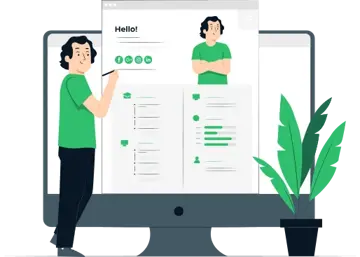
Build your Resume in 15 minutes
Create an awesome resume that meets the expectations of potential employers with our selection of professional, field-tested resume templates.

